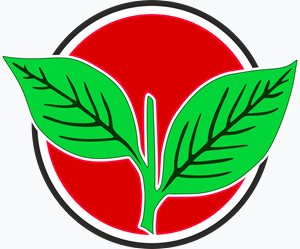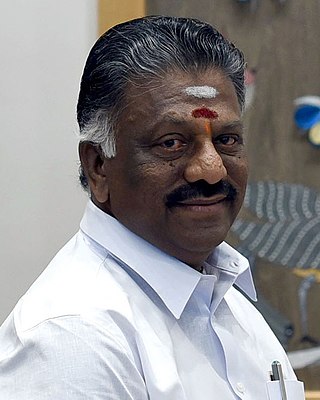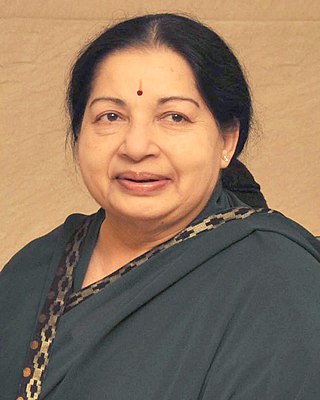
The All India Anna Dravida Munnetra Kazhagam is an Indian regional political party with great influence in the state of Tamil Nadu and the union territory of Puducherry. It is a Dravidian party founded by the former chief minister of Tamil Nadu M. G. Ramachandran (M.G.R.) at Madurai on 17 October 1972 as a breakaway faction from the Dravida Munnetra Kazhagam after M. Karunanidhi expelled him from the party for demanding an account as the party treasurer. The party is adhering to the policy of socialism and secularism based on the principles of C. N. Annadurai (Anna) collectively coined as Annaism by M.G.R. The party has won a seven-time majority in the Tamil Nadu Legislative Assembly and has emerged as the most successful political outfit in the state's history. It is currently the main opposition party in the Tamil Nadu Legislative Assembly.

Ottakarathevar Panneerselvam, popularly known as OPS is an Indian politician who was the 6th Chief Minister of Tamil Nadu from 2016 to 2017 and previously 2001 to 2002 and 2014 to 2015. He was also as the 2nd Deputy Chief Minister of Tamil Nadu from 21 August 2017 to 6 May 2021. As a finance minister, he has presented the Tamil Nadu State Budget 11 times.

The twelfth legislative assembly election of Tamil Nadu was held on 10 May 2001. All India Anna Dravida Munnetra Kazhagam (AIADMK)-led front won the elections and its general secretary, J. Jayalalithaa was sworn in as Chief Minister, even though she could not legally run as MLA in this election. She was unanimously nominated as Chief Minister by her party and was ready to serve her second term. But due to criminal and corruption charges from her first term, on 21 September 2001, a five-judge constitutional bench of the Supreme Court of India ruled in a unanimous verdict that "a person who is convicted for a criminal offense and sentenced to imprisonment for not less than two years cannot be appointed the Chief Minister of a State under Article 164 (1) read with (4) and cannot continue to function as such". Thereby, the bench decided that "in the appointment of Dr. J. Jayalalithaa as Chief Minister there has been a clear infringement of a Constitutional provision and that a writ of quo warranto must issue". In effect, her appointment as Chief Minister was declared null and invalid with retrospective effect. Therefore, technically, she was not the Chief Minister in the period between 14 May 2001 and 21 September 2001. After her resignation on 21 September 2001, she put in O. Panneerselvam, as the official 13th Chief Minister of Tamil Nadu, until she could clear up the charges from her first term, so she can take up the mantle of Chief Minister officially, on 2 March 2002.

Edappadi Karuppa Palaniswami, often referred to by his initials E.P.S., is an Indian politician who is the former chief minister of Tamil Nadu and the current leader of opposition in the Tamil Nadu Legislative Assembly. He served as the 7th chief minister of Tamil Nadu, from 2017 to 2021. He has been the General Secretary of All India Anna Dravida Munnetra Kazhagam since 28 March 2023. Palaniswami served as the Joint Coordinator of the AIADMK from 2017 to 2022 and Interim General Secretary of the AIADMK from 2022 to 2023. He also served as the Headquarters Secretary of the AIADMK from 2016 to 2022.

Twelfth Assembly of Tamil Nadu was instituted after the victory of AIADMK and allies, in the 2001 state assembly election. O. Panneerselvam officially became the 13th and J. Jayalalithaa became the 14th Chief Minister of Tamil Nadu due to the election. Even though Jayalalithaa was the Chief Minister between 14 May and 21 September 2001, the Supreme Court of India, declared that she did not legally hold the post, due to corruption charges from her previous Chief ministership.

Jayaram Jayalalithaa was an Indian politician and actress who served as Chief Minister of Tamil Nadu for more than fourteen years over six terms between 1991 and 2016. From 9 February 1989 to 5 December 2016, she was the 5th and longest-serving general secretary of the All India Anna Dravida Munnetra Kazhagam (AIADMK), a Dravidian party whose cadre revered her as their "Amma" (Mother) and "Puratchi Thalaivi".
K. A. Jayapal is an Indian politician and was a member of the 14th Tamil Nadu Legislative Assembly from Nagapattinam constituency. He represented the All India Anna Dravida Munnetra Kazhagam (AIADMK) party.
P. Chendur Pandian was an Indian politician and member of the 14th Tamil Nadu Legislative Assembly from Kadayanallur constituency. He represented the All India Anna Dravida Munnetra Kazhagam party.
Kadambur C. Raju is an Indian politician and the member of Tamil Nadu Legislative Assembly from the Kovilpatti constituency. He represents the All India Anna Dravida Munnetra Kazhagam (AIADMK) party.
Vivekanandan Krishnaveni Sasikala, also known by her married name Sasikala Natarajan, and often referred to by her initials VKS, is an Indian politician. She was a close associate of J. Jayalalithaa, the late chief minister of Tamil Nadu, who headed the All India Anna Dravida Munnetra Kazhagam (AIADMK) from 1989 until her death in 2016. After Jayalalithaa's death, the party's general council elected her as a temporary secretary general of AIADMK. Before entering the Central Prison in Bangalore, Sasikala appointed Edappadi K. Palanisamy as Chief Minister of Tamil Nadu. Palanisamy and other ministers removed her from the post and expelled her from the party in September 2017. Her dismissal was upheld in April 2022.

Jayaram Jayalalithaa, commonly referred to as Jayalalithaa, was an Indian politician who was the six time Chief Minister of the Indian state of Tamil Nadu. She was initially convicted for misusing her office during her tenure of 1991–96. Subramanian Swamy was the chief petitioner. Some of the allegations involved spending on her foster son's lavish marriage in 1996 and her acquisition of properties worth more than ₹66.65 crore, as well as jewellery, cash deposits, investments and a fleet of luxury cars. This was the first case where a ruling chief minister had to step down on account of a court sentence. Ultimately, in May 2015, her conviction was overturned, she was acquitted of all charges, and she then died before the Supreme Court of India reviewed the case in 2017.
TANSI land acquisition case was a sensational case against J. Jayalalithaa in Tamil Nadu, during 1991-96. Jaya Publication and Sasi Enterprises, the companies in which J. Jayalalithaa and her aide V. K. Sasikala had holdings, purchased lands of Tamil Nadu Small Industries Corporation (TANSI), a state government agency, in 1992. The case was filed by Subramanian Swamy and chargesheet were filed during the following DMK government headed by M. Karunanidhi in 1996. Jayalalitha and her aide, Sasikala were convicted in the lower court, which sentenced her to two year rigorous imprisonment and fined ₹50,000 on 9 October 2000. The case had political implications as Jayalalithaa was disqualified from contesting the 2001 Tamil Nadu Legislative Assembly election. Though Jayalalithaa's nomination papers were rejected, she took oath as chief minister after the victory of AIADMK in the elections. The Supreme Court disqualified her in September 2001, resulting in her stepping down and elevation of O. Panneerselvam as the chief minister. The governor of Tamil Nadu, Fathima Beevi, who administered oath to J. Jayalalithaa, was advised to step down by the union ministry, who also sent the report to the President of India.
The Pleasant Stay hotel case was a case against Jayalalithaa, the late Chief Minister of Tamil Nadu, a state in South India during her tenure in 1991–1996. Jayalalitha and her ministerial colleague, V. R. Nedunchezhiyan and T. M. Selvaganapathy, were charged with misusing the office to allow Pleasant Stay Hotel in Kodaikanal to build seven floors against the norms. The case and charge sheet were filed during the following Dravida Munnetra Kazhagam (DMK) government headed by Karunanidhi in 1996. Jayalalitha and Selvaganapathy were convicted in the lower court, which sentenced her to one-year imprisonment to the two and three others involved. The case had political implications as the aftermath of violence created a furor in the state. The statewide violence resulted in the burning of five buses, damaging fifty buses, and leaving 40 people injured. Three girls students of the Tamil Nadu Agricultural University were burnt alive in a bus in Dharmapuri. The three AIADMK party workers who were convicted in the case received a death sentence in the case in 2007, but it was commuted to life imprisonment. The case had political implications as Jayalalithaa was disqualified from contesting the 2001 Tamil Nadu Legislative Assembly election. Though Jayalalithaa's nomination papers were rejected, she took oath as chief minister after the victory of AIADMK in the elections. The Supreme Court disqualified her in September 2001, resulting in her stepping down and elevation of O. Panneerselvam as the chief minister. The governor of Tamil Nadu, Fathima Beevi, who administered oath to J. Jayalalithaa, was advised to step down by the union ministry, who also sent the report to the President of India.
O. Panneerselvam was sworn in as Chief Minister of Tamil Nadu on 6 December 2016. O. Panneerselvam was elected as the Chief Minister of Tamil Nadu following the death of incumbent Chief Minister Jayalalithaa.

The Sixteenth Tamil Nadu Legislative Assembly Election was held on 6 April 2021, to elect representatives from the 234 constituencies in the Indian state of Tamil Nadu. The Dravida Munnetra Kazhagam (DMK) won the election, ending the decade-long reign of the All India Anna Dravida Munnetra Kazhagam (AIADMK). The DMK's leader M. K. Stalin became the eighth Chief Minister of Tamil Nadu, and the 12th Chief Minister since the 1956 reorganization. He replaced Edappadi K. Palaniswami of the AIADMK.

J. Jayalalithaa was sworn in as Chief Minister of Tamil Nadu on 23 May 2016. Two major political parties Dravida Munnetra Kazhagam (DMK) and All India Anna Dravida Munnetra Kazhagam (AIADMK) faced the assembly election held on 16 May 2016 for the 232 seats of the Legislative Assembly in the state of Tamil Nadu in India. AIADMK under J. Jayalalithaa won the elections and became the first ruling party to be re-elected in the state since 1984 with a simple majority. On 22 September 2016, Jayalalithaa was hospitalised as her health condition worsened. Her official duties were handed over to her aide O. Panneerselvam on 12 October 2016, though she continued to remain as the chief minister of the state. On 5 December 2016, the hospital announced her death and O. Panneerselvam sworn in as her successor.

J. Jayalalithaa was sworn in as Chief Minister of Tamil Nadu on 23 May 2015. Earlier Jayalalithaa was charged of Rs 66.66 crore disproportionate assets case and forced to resign in the year 2014. O. Panneerselvam her trusted aide assumed the office then resigned after her return in 2015.
O. Panneerselvam assumed the office after previous Chief Minister Jayalalithaa was forced to resign in the year 2014. O. Panneerselvam her trusted aide assumed the office then resigned after her return on 23 May 2015.

As O. Panneerselvam who was Chief Minister from 2 March 2002 resigned, Governor appointed J. Jayalalithaa as the Chief Minister to head the New Government and appointed 26 more ministers on the same day. It was her return to power as she had resigned the post earlier on 21 September 2001.

After the General Elections held on 10 May 2001 the Governor appointed J. Jayalalithaa as the Chief Minister of Tamil Nadu. The Governor on the advice of the Chief Minister appointed five more Members C. Ponnaiyan, Dr. M. Thambi Durai, D. Jayakumar, Ayyaru Vandayar and R. Sarojaa as ministers in the Council of Ministers on the same day. On 19 May 2001 the Governor appointed nineteen more members in the council. However, Jayalalithaa couldn't last long in office and resigned to pave way for First Panneerselvam ministry.






